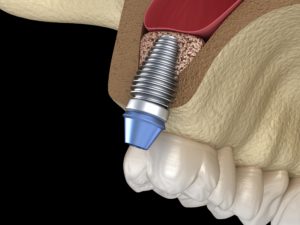 If you’ve lost a tooth or two, or even an entire arch, dental implants are the next best thing to real teeth. A dental implant is unlike any other treatment because it replaces both the root and the crown. As a result, you must have a healthy jawbone to support your new smile. Unfortunately, bone loss is a common problem, but new research may have found the secret to preserving your jaw. Vitamin K2 could be the natural solution you need to ensure your dental implants have a strong foundation.
If you’ve lost a tooth or two, or even an entire arch, dental implants are the next best thing to real teeth. A dental implant is unlike any other treatment because it replaces both the root and the crown. As a result, you must have a healthy jawbone to support your new smile. Unfortunately, bone loss is a common problem, but new research may have found the secret to preserving your jaw. Vitamin K2 could be the natural solution you need to ensure your dental implants have a strong foundation.
What is Vitamin K2?
Your body relies on a variety of vitamins and minerals to stay healthy and for your body to perform essential functions. Most are acquired through your diet, but if you’re not eating the right foods, it can leave you deficient in certain nutrients.
Your body relies on vitamin K, which is absorbed with fats and stored in fatty tissues. The fat-soluble vitamin can be found in 2 types: vitamin K1 and vitamin K2. Both are essential for strong, healthy bones and also aid with blood clotting. However, Integrative Medicine: A Clinician’s Journal reports that vitamin K2 can also prevent calcium deposits on the blood vessel walls.
Studies have also found that it can help protect bone health more than vitamin K1. Low vitamin K intake is connected to low bone mass, osteoporosis, and an increased risk of fractures.
Vitamin K2 and Dental Implants
Replacing a tooth with a dental implant requires a multi-step process that begins with your placement surgery. A titanium post is surgically inserted into the jawbone to mimic a root. An abutment is connected to the post to attach a customized restoration.
Most people with good oral and general health are candidates for the procedure. However, bone loss isn’t an uncommon issue for people interested in dental implants. You can lose 25% of your jawbone’s density within the first year of missing a tooth. Your jaw will continue to deteriorate over time.
Your dentist will review a CT scan of your jaw during your consultation to ensure your jaw is healthy. If it doesn’t have adequate density, you’ll require bone grafting before your placement surgery.
Besides treating tooth loss early, you can lessen your risk of needing bone grafting by adding vitamin K2 to your diet. Healthcare professionals recommend taking 180 mcg of vitamin K daily to prevent bone loss, especially after menopause.
You can promote a healthy mouth and body by eating a nutritious diet that contains essential vitamins and minerals. With a balanced diet, good oral hygiene, and regular care from a dentist, your dental implants can last for a lifetime.
About Dr. Spiro Saati
Dr. Saati earned his dental degree from the Boston University Goldman School of Dental Medicine and has completed advanced training in periodontology, dental implants, and many other specialties. He is a member of many professional organizations, including the American Dental Association. If you’re ready to replace your missing teeth, request an appointment through our website or call (978) 548-6243.